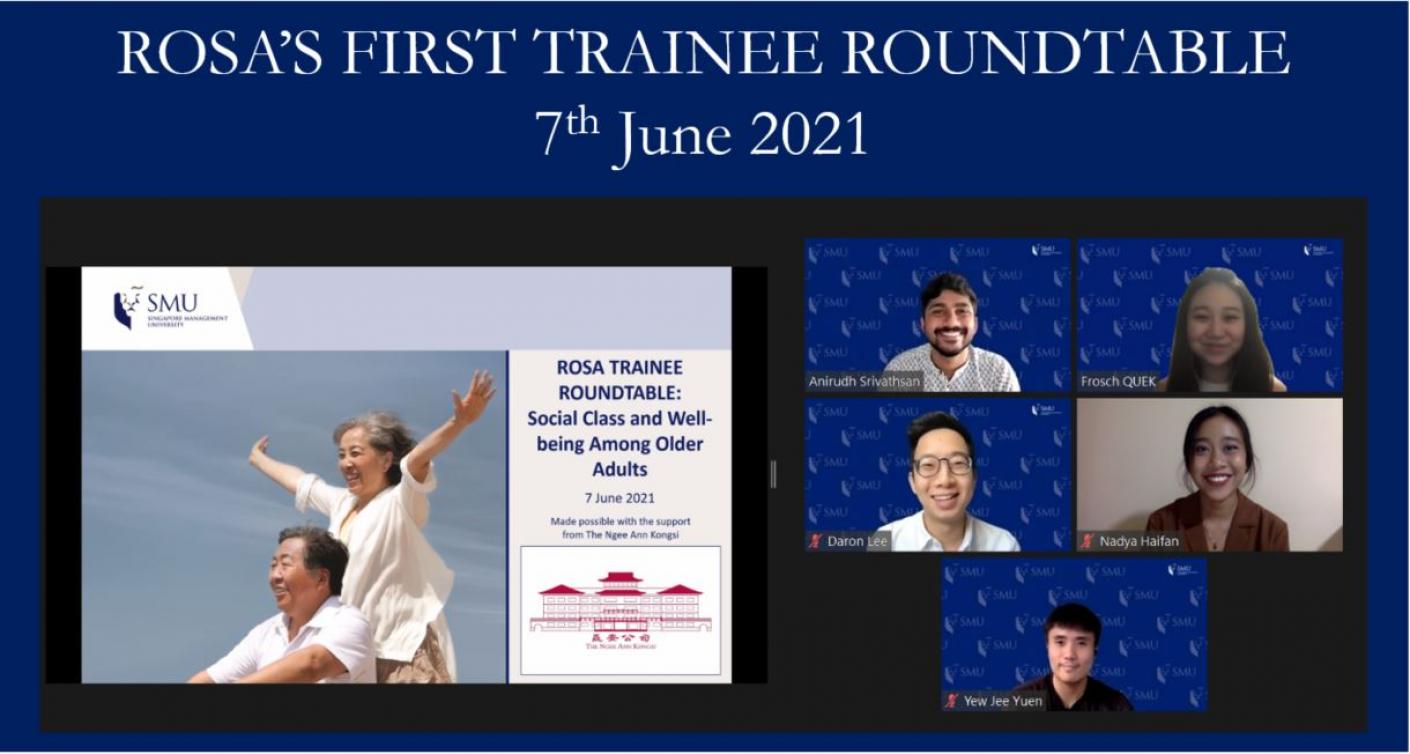
What do the young know about ageing?
In the Centre for Research on Successful Ageing’s (ROSA) first ever Trainee Roundtable, titled ‘What do the young know about ageing?’, our trainees presented their research findings on social class and well-being among older adults in Singapore. Hosted and organised by our trainees, Mr Anirudh Srivathsan and Mr Dyan See Toh Jun Wei respectively, the virtual roundtable was held on 7th June 2021. More than 40 undergraduate and postgraduate students from Singapore Management University (SMU) joined us in this event!
The roundtable began with an opening statement by Professor Paulin Straughan, Director of ROSA, who expressed her deep admiration and appreciation for the trainees’ hard work during their stint at ROSA. While the trainees had only been with the centre for a short time, she highlighted that many of them had managed to pick up the relevant skills quickly and had made significant contributions to the centre.
After Professor Straughan’s opening statement, the trainees began their individual presentations. Below is a summary of these presentations.
The first presentation at the roundtable was given by Miss Nadya Haifan. Titled ‘Capturing Socioeconomic Status (SES) amongst Older Adults in Singapore’, she recommended for SES to be conceptualized using 4 main variables, in the following rank order: Income, Housing, Occupation, and Education. Although well-established, Miss Nadya emphasised that traditional SES measures (i.e., income, occupation, and education) have to be re-evaluated in terms of their applicability to the older adult population in Singapore, using data from the Singapore Life Panel (SLP). Variables such as occupation and education are less salient SES indicators due to the following reasons (1) labour choices may be motivated by reasons apart from financial needs, such as leisure, which makes occupational stratification more difficult to identify; (2) educational attainment is more common at the lower levels within the older population and have less variance. The fourth variable, housing, was included with the consideration that housing is a key indicator of spatial stratification, which older adults are especially vulnerable given their limited mobility. One of ROSA’s objectives is to be able to construct a single SES index that would be able to capture these various dimensions of SES holistically and concurrently. Thus, considering these demographic-specific challenges, Miss Nadya recommends constructing an SES index using Principal Component Analysis, weighted according to the rank order.
With her presentation titled ‘Social Network Difference in Older Adults: Data from the Singapore Life Panel’, Miss Frosch Quek presented next on the differences in older adults' social network by their social class, as indicated by education, income, and housing. Miss Frosch shared that older adults with higher social class (i.e., higher education level, income level, and better housing) often have greater levels of social capital, as well as healthier, longer lasting relationships with members of their social networks. However, higher social class individuals were also found to have lower network density; in sum, older adults with higher social class have less tightly knitted networks as compared to their counterparts with lower social class. Her findings inform policymakers and academics of the possible influence of class divide on healthy social relationships. She also emphasised the need for future work relating to exploring the social aspect of successful ageing to pay caution to possible social class confounds.
Mr Daron Lee delivered the third presentation on resilience among older adults in Singapore. Psychological resilience is commonly conceptualized as a mental resource that individuals can rely upon to overcome hurdles - a highly resilient individual would be able to encounter a challenge, tackle it successfully, and continue moving on without the challenge having any major effect on them, while an individual that is not as resilient may have difficulties taking on challenges and possibly allowing these challenges to affect them for an extended period. Understanding what determines and shapes the extent to which older adults are ‘psychologically resilient’ is thus paramount in ensuring for the mental well-being of older adults. Using data from the SLP, Mr Daron presented some preliminary analysis on these issues. His results showed that three factors were significant in predicting the psychological resilience of older adults: education level, wealth, and social satisfaction. Across these factors, greater levels of education, wealth and social satisfaction was found to be associated with higher levels of psychological resilience. Given this, he emphasised the need to get a better understanding of resilience and the factors that shape it so as to enable lower educated individuals, individuals who had lower levels of wealth, and individuals with lower levels of social satisfaction, to achieve higher levels of psychological resilience.
In the final presentation, Mr Yew Jee Yuen presented his paper on ‘Correlations between Job Routineness and Well-being’. His paper analysed the following: (1) what kind of jobs have higher levels of task-based routineness, and lead to better well-being outcomes; and (2) how does the level of task-based routineness in a person’s occupation affect his/her well-being outcomes. Mr Jee Yuen shared that while links between job classification and job routineness were unclear, well-being outcomes tend to be more positive for people in managerial, professional, or government-related occupations. Furthermore, jobs with a larger proportion of non-routine interactive tasks tend to result in more positive well-being outcomes, while jobs with a larger proportion of non-routine manual tasks tend to result in less positive well-being outcomes.
Following each presentation, the Q&A sessions led to lively and informative exchange on the various topics. Such insights were appreciated by our presenters, and the ROSA team was greatly inspired by the level of interest that the SMU student community showed in ageing-related issues. It is the team’s hope that such engagements with the student community will enable more conversations around the pressing issue of preparing for an ageing society among the younger generations who will be the drivers of the social changes needed to adapt.
We would like to thank all attendees for their support and active participation. We look forward to seeing you at our next roundtable!